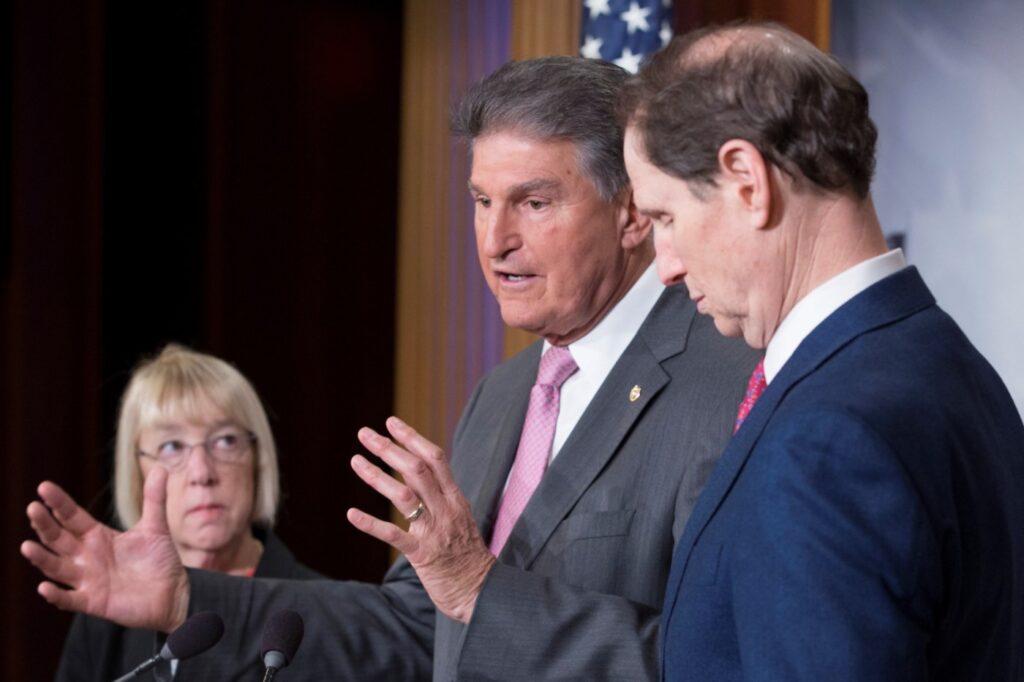
President Joe Biden and the Democratic leadership were far from gracious in their response to the news that Sen. Joe Manchin of West Virginia has decided to vote “no” on the administration’s $2 trillion Build Back Better plan. The moderate Democrat, who represents one of the most conservative states, was the swing vote in the evenly divided Senate.
White House Press Secretary Jen Psaki’s statement was unusual in its length and ad hominem tone. She said Manchin’s comments “represent an inexplicable reversal in his position, and a breach of his commitments to the president and the senator’s colleagues in the House and Senate.” Liberal publications savaged his decision.
Senate Majority Leader Chuck Schumer, D-New York, said he will call for a vote anyway in an effort to force every senator to “make their position known.” That’s his prerogative, of course. Progressives are angry, but we’d give Manchin a “profiles in courage” award for holding firm.
“I cannot take that risk with a staggering debt of more than $29 trillion and inflation taxes that are real and harmful to every hard-working American,” he said, accusing his Democratic colleagues of trying to “dramatically reshape our society.” Manchin is right to express concerns about the inflationary effects of this massive social-welfare spending legislation.
The nation already has a daunting amount of debt. Inflation soared 6.8% in November and that doesn’t fully account for the eye-popping price increases for housing and automobiles. Some of those price hikes are the result of unusual supply chain issues related to COVID-19, but uncontrolled federal spending is driving many price hikes.
Build Back Better would expand government spending to levels not seen since the New Deal. Even supporters touted the FDR comparisons, with its proposed federal spending spree on childcare, Medicare, elder care, climate-change programs (the Green New Deal), an expansion of healthcare programs, paid leave, preschool and so on.
A new study by the centrist Niskanen Center notes that a policy of subsidies results “in a vicious cycle in which subsidies for supply-constrained goods or services merely push up prices, necessitating greater subsidies, which then push up prices, ad infinitum.” The Biden plan would have accelerated that process.
As a variety of analysts have noted, regulations drive up the cost of living, with land-use rules limiting housing, rent control (and eviction moratoriums) discouraging people from investing in rental housing, and climate rules boosting gasoline and utility costs. Instead of hiking subsidies, governments need to let our market economy work.
The libertarian Cato Institute used the example of childcare. Build Back Better would have ratcheted up subsidies at the same time as it choked the supply of childcare centers by imposing new living-wage and occupational-licensing requirements. The likely result would be a price run-up or shortages.
Meanwhile, churning the monetary printing presses creates demand-pull inflation because the extra cash increases demand. “Rising consumer demand for goods is increasing consumer prices, and it is also putting pressure on businesses to increase production while they are constrained by supply chain disruptions and labor shortages,” Congress’ Joint Economic Committee noted.
Biden ignored these facts, and argued that his spending plan would actually reduce inflationary pressures. Fortunately, Manchin called Democrats out on their fantasy economics — and might have saved the administration from itself.
